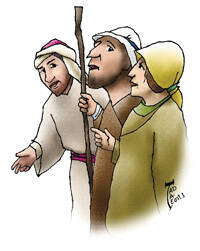Walking Into Hope
They are walking away from Jerusalem, away from the place where their hopes were shattered. Cleopas and his unnamed companion—perhaps his wife?—stride in the direction of Emmaus, known in Roman times as Nicopolis, “Victory City.” They were in sore need of a victory.
“We were hoping that he would be the one to redeem Israel” (Lk 24:21)
• In what ways have Scripture study and the Eucharist fanned the flames of hope in your faith community?
• Ask Jesus to walk with you into Easter hope.
Today’s Gospel is a story of how Jesus’ followers moved from expectant wishing to being grounded in true hope. What they had been wishing for was someone who would rescue them from bondage, someone who would singlehandedly transform their situation for them. Most likely they thought this would happen through a violent wresting of power.
What they got instead was a new story, a new way of seeing and hearts inflamed with hope. The door was opened to a new way of being for them and for us that far transcended anything for which they had wished.
In 1990, three years before he became the first president of the Czech Republic, Vaclav Havel offered these reflections on hope: “Hope is a state of mind, not of the world.... Either we have hope or we don’t; it is a dimension of the soul...an orientation of the spirit;...it is not the same thing as joy that things are going well...but rather an ability to work for something because it is good, not just because it stands a chance to succeed.... Hope is not the conviction that something will turn out well, but the certainty that something makes sense, regardless of how it turns out.” Havel captures poetically what Luke tells narratively about how hope began to burn in the hearts of Jesus’ first followers. While blindly fleeing Jerusalem because things did not turn out well, according to their wishes, the disciples come to see that Jesus’ death is not the end of all their wishful longings nor an isolated act that rescues them but is the culminating point of a whole way of life that embodies hope.
In the breaking of the bread, the disciples do not see only a changed Jesus; they come to see the whole world as changed. Jesus has liberated them from sin and death, but the saving work is not completed until disciples embrace his way of living eucharistically. Only when Jesus’ followers live in such a way that they risk their own bodies being broken and blood poured out in love for others is hope fanned into flame. Cleopas and his companion are able to choose to return to Jerusalem, the city that kills the prophets (Lk 13:34) and could kill them, when their eyes become opened.
Sight is transformed not so much in one magical moment but in a lengthy process of praying and studying the Scriptures, of walking with others and struggling to understand from their perspective, of daily taking, blessing, breaking and sharing bread in eucharistic gatherings, all the while urging Jesus to “stay with us.” When a transformative moment happens, when we let go our puny wishes and become aflame with hope, the Jesus we thought we knew vanishes, and the risen Christ remains.In Jerusalem, Cleopas and his companion rejoin the gathered community, who are likewise transformed. Together with the women who had gone to the tomb and Simon, they see with new eyes and tell a new story, able now to lead others in the ongoing journey into hope.
This article also appeared in print, under the headline “Walking Into Hope,” in the May 2, 2011, issue.










